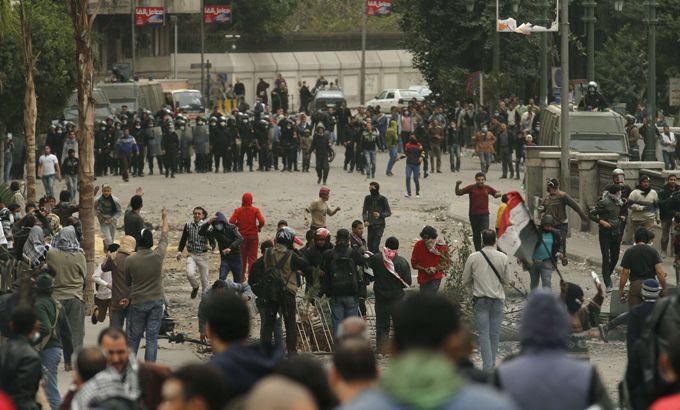Egyptian protesters defy emergency law
Protesters defy curfew in Port Said, Ismailiyah and Suez as key opposition bloc rejects Morsi’s call for talks.

Thousands of protesters have taken to the streets of Egyptian cities of Port Said, Ismailiyah and Suez in defiance of President Mohamed Morsi’s declaration of a curfew and a state of emergency after days of deadly unrest.
The crowds shouted “Down down with Mohamed Morsi, down down with the state of emergency,” in Ismailiyah and similar slogans were heard in the other cities along the Suez Canal.
Five days of unrest has led to 50 deaths, and police once again clashed with protesters in Suez and downtown Cairo on Monday. At least two people were killed in Monday’s clashes in Port Said, reported Al Jazeera’s Rawya Rageh from the Suez Canal town. In Suez, meanwhile, hundreds of prisoners at a city jail made a failed attempt to escape during chaotic protests.
Egypt’s senate on Monday ratified a law that would grant the armed forces powers of arrest.
In Port Said, however, Al Jazeera’s Rageh reported that the army was not enforcing the curfew.
“Thousands poured into the streets when the curfew went into effect, in clear defiance of President Morsi in all three cities,” she reported late on Monday.
“The military has completely pulled back, and in some instances even allowed protesters to pose for pictures on tanks in the streets. They do not appear to be trying to enforce the curfew in the streets of Port Said.”
Talks boycott
Earlier, the country’s main opposition coalition declined to join a national dialogue called by Morsi because the proposal is not genuine and the group will only attend future talks if a list of conditions are met, members said.
Morsi invited his allies and rivals for talks on Monday to try to resolve a political crisis and end violence on the streets that erupted during anti-government protests.
The National Salvation Front, which rejected a similar call for dialogue last year during another spasm of unrest, saw Morsi’s call as “cosmetic and not substantive”, said leading member of the coalition Mohamed ElBaradei.
“We will not go to the dialogue today,” ElBaradei told a news conference after the Front’s members met in Cairo to discuss the invitation.
“We will send a message to the Egyptian people and the president of the republic about what we think are the essentials for dialogue. If he agrees to them, we are ready for dialogue.”
Al Jazeera’s Mike Hanna, reporting from the capital city of Cairo, said the National Salvation Front’s refusal to participate in the talks is “very significant”.
“The broad swathe of opposition within Egypt is not prepared to sit down and talk to President Morsi and his government unless those very stringent preconditions are met,” said Hanna, referring to the National Salvation Front’s demands for discussion of a national unity government and constitutional amendments.
“This essentially means that President Morsi’s attempts to renew a form of national dialogue are stumbling very much at the starting post at they have done before.”
The coalition’s conditions included a demand that Morsi accept responsibility for the bloodshed and agree to form a
government of national salvation, echoing previously unmet demands by the opposition.
“We have accepted dialogue [in the past] and went to the president in his office and spoke to him,” said leftist politician Hamdeen Sabahy.
“We did not refuse dialogue. But the result was he issued an oppressive decree.”
Opposition politicians were enraged late last year when Morsi issued a decree awarding himself extra powers that the
president’s allies said were essential to help push Egypt’s transition forward.
Rivals saw it as a power grab.
Opposition politicians were particularly angered that they had not been given any indication of Morsi’s plans for such a sweeping move in their individual talks with him shortly before the decree was issued.